人教版九年级全册Unit 13 We're trying to save the earth!单元知识点总结
文档属性
| 名称 | 人教版九年级全册Unit 13 We're trying to save the earth!单元知识点总结 | 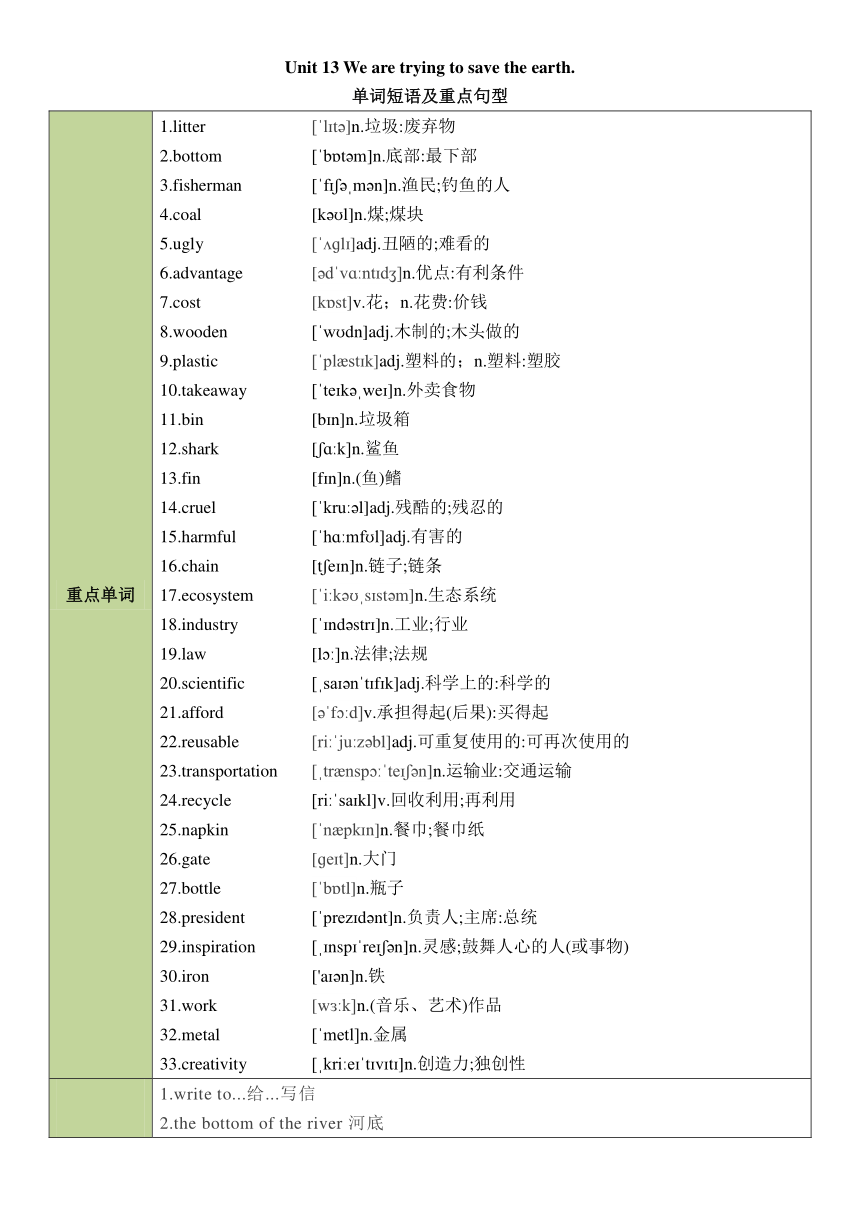 | |
| 格式 | docx | ||
| 文件大小 | 38.7KB | ||
| 资源类型 | 教案 | ||
| 版本资源 | 人教新目标(Go for it)版 | ||
| 科目 | 英语 | ||
| 更新时间 | 2024-05-16 11:19:39 | ||
图片预览

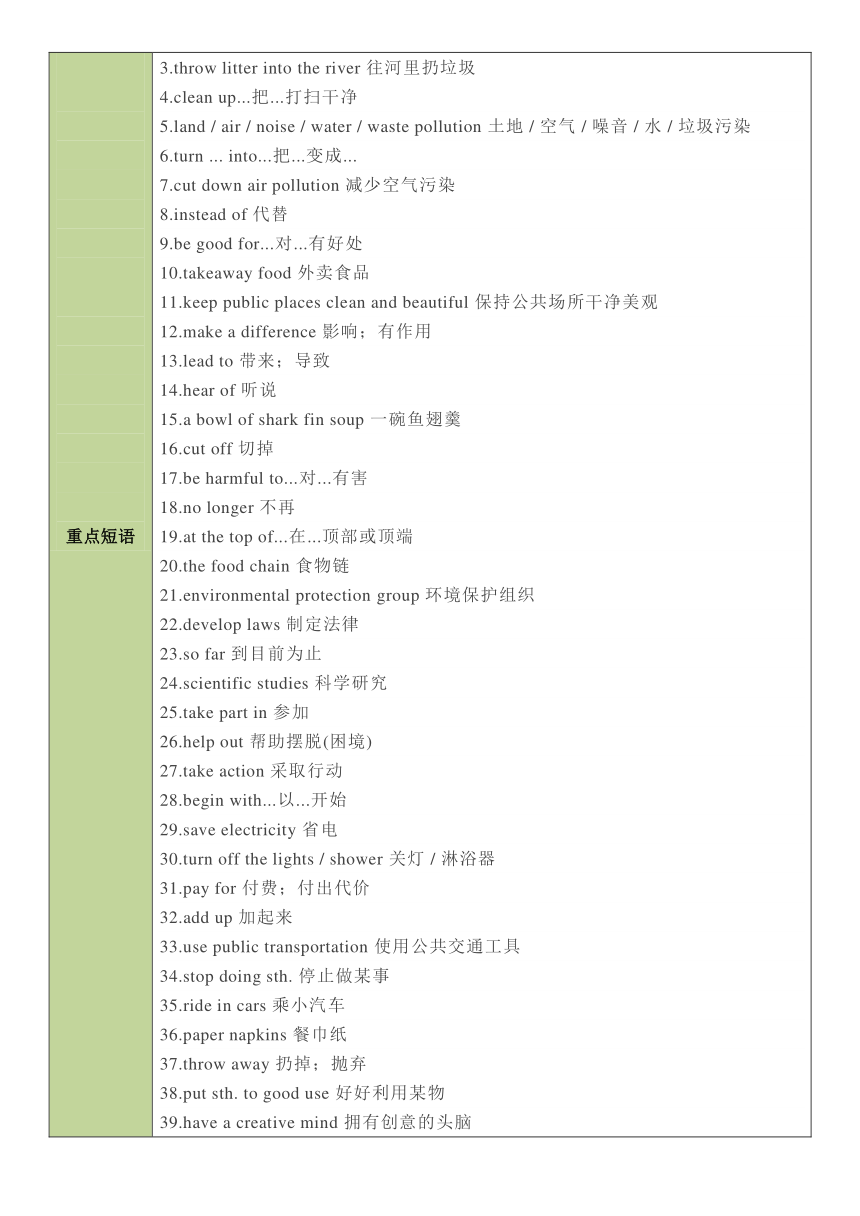
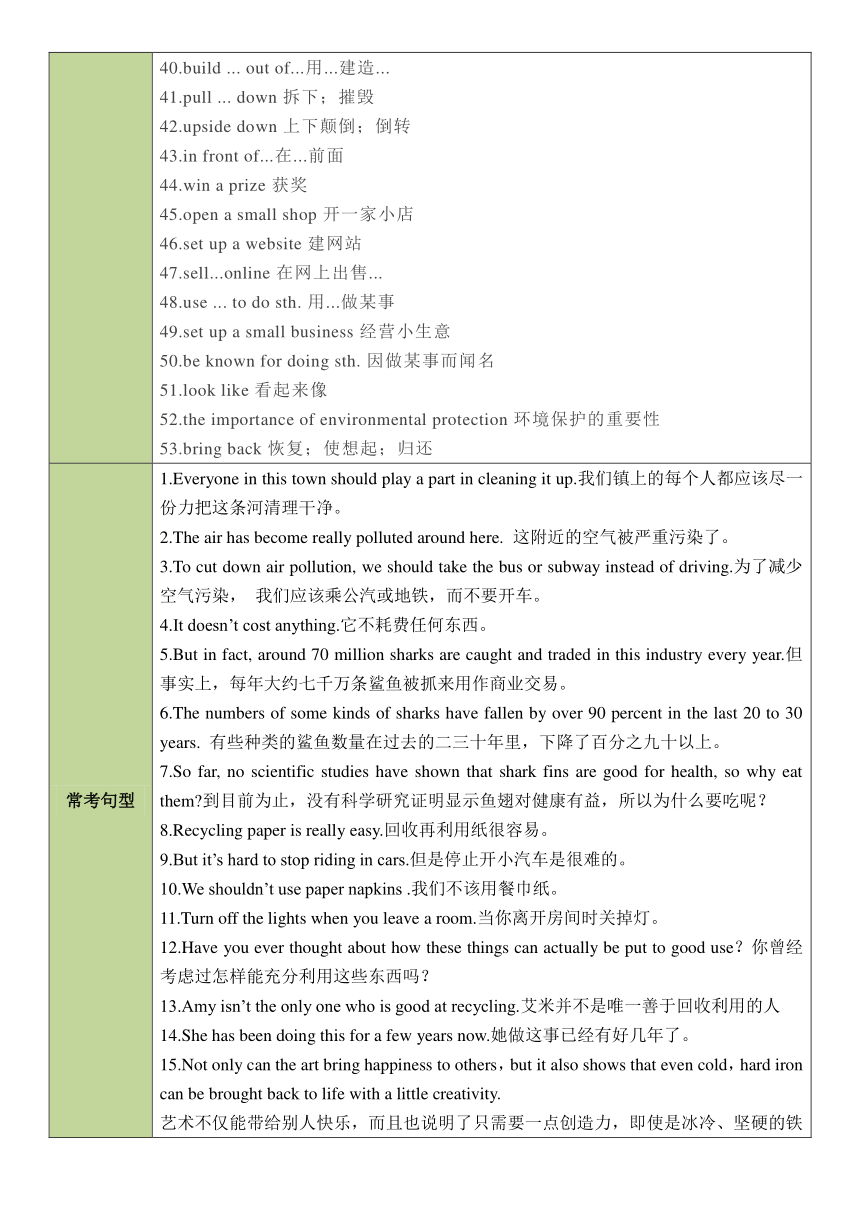
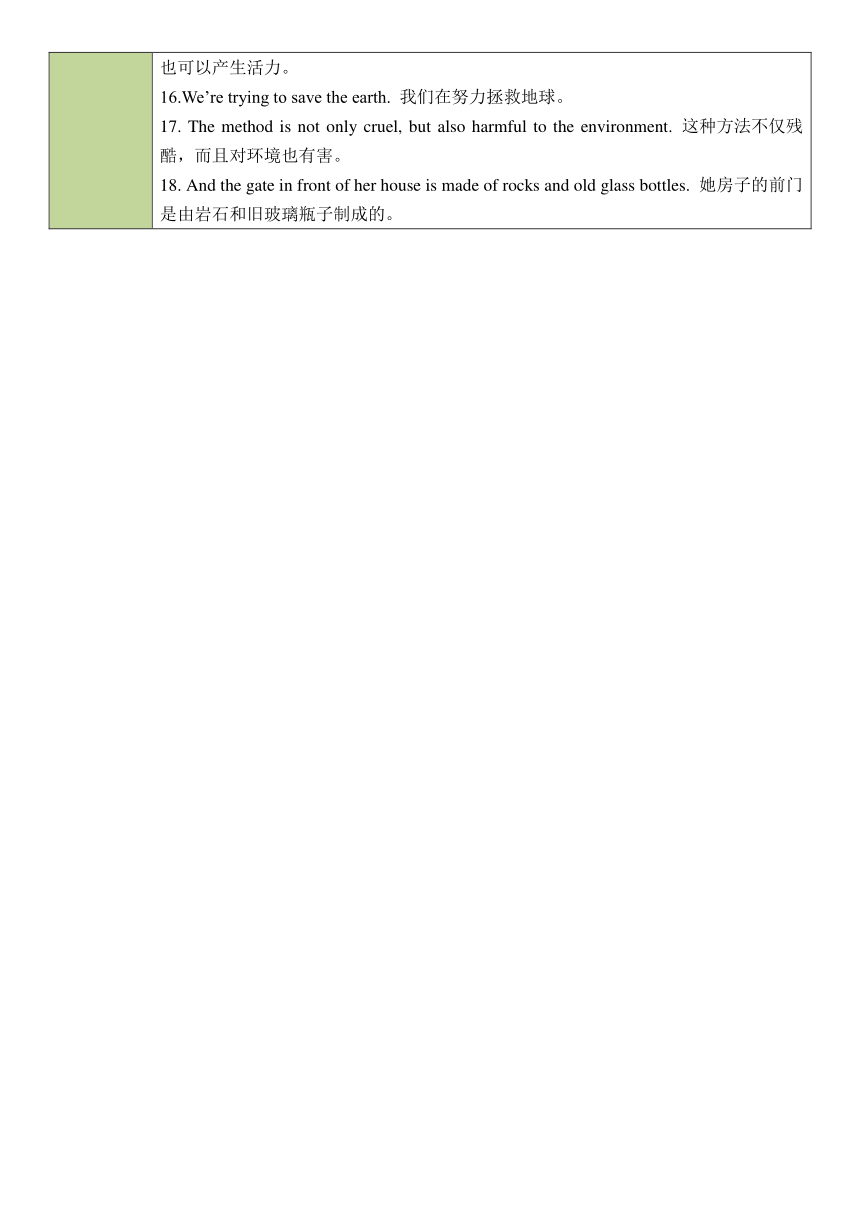
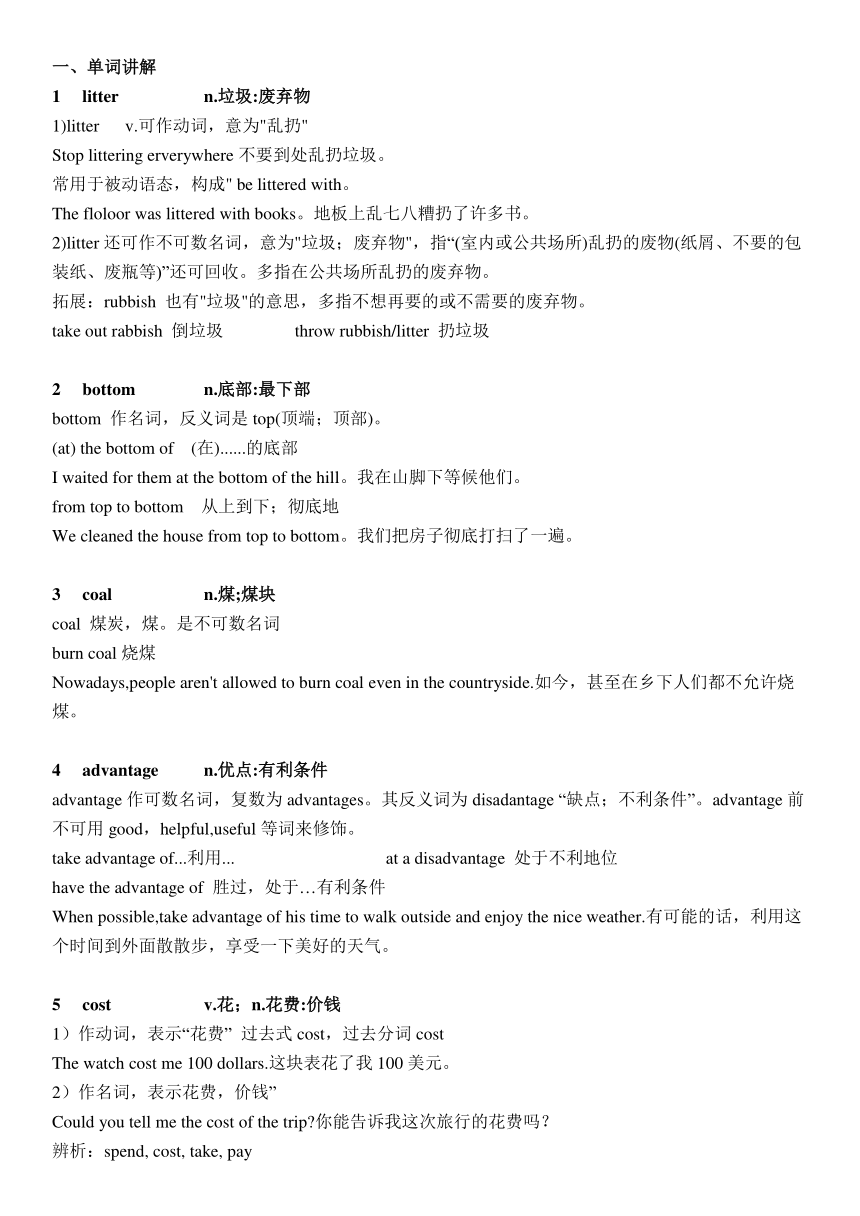
文档简介
Unit 13 We are trying to save the earth.
单词短语及重点句型
重点单词 1.litter [ l t ]n.垃圾:废弃物 2.bottom [ b t m]n.底部:最下部 3.fisherman [ f m n]n.渔民;钓鱼的人 4.coal [k l]n.煤;煤块 5.ugly [ ɡl ]adj.丑陋的;难看的 6.advantage [ d vɑ nt d ]n.优点:有利条件 7.cost [k st]v.花;n.花费:价钱 8.wooden [ w dn]adj.木制的;木头做的 9.plastic [ pl st k]adj.塑料的;n.塑料:塑胶 10.takeaway [ te k we ]n.外卖食物 11.bin [b n]n.垃圾箱 12.shark [ ɑ k]n.鲨鱼 13.fin [f n]n.(鱼)鳍 14.cruel [ kru l]adj.残酷的;残忍的 15.harmful [ hɑ mf l]adj.有害的 16.chain [t e n]n.链子;链条 17.ecosystem [ i k s st m]n.生态系统 18.industry [ nd str ]n.工业;行业 19.law [l ]n.法律;法规 20.scientific [ sa n t f k]adj.科学上的:科学的 21.afford [ f d]v.承担得起(后果):买得起 22.reusable [ri ju z bl]adj.可重复使用的:可再次使用的 23.transportation [ tr nsp te n]n.运输业:交通运输 24.recycle [ri sa kl]v.回收利用;再利用 25.napkin [ n pk n]n.餐巾;餐巾纸 26.gate [ɡe t]n.大门 27.bottle [ b tl]n.瓶子 28.president [ prez d nt]n.负责人;主席:总统 29.inspiration [ nsp re n]n.灵感;鼓舞人心的人(或事物) 30.iron ['a n]n.铁 31.work [w k]n.(音乐、艺术)作品 32.metal [ metl]n.金属 33.creativity [ kri e t v t ]n.创造力;独创性
重点短语 1.write to...给...写信 2.the bottom of the river 河底 3.throw litter into the river 往河里扔垃圾 4.clean up...把...打扫干净 5.land / air / noise / water / waste pollution土地 / 空气 / 噪音 / 水 / 垃圾污染 6.turn ... into...把...变成... 7.cut down air pollution 减少空气污染 8.instead of 代替 9.be good for...对...有好处 10.takeaway food 外卖食品 11.keep public places clean and beautiful 保持公共场所干净美观 12.make a difference 影响;有作用 13.lead to 带来;导致 14.hear of 听说 15.a bowl of shark fin soup 一碗鱼翅羹 16.cut off 切掉 17.be harmful to...对...有害 18.no longer 不再 19.at the top of...在...顶部或顶端 20.the food chain 食物链 21.environmental protection group 环境保护组织 22.develop laws 制定法律 23.so far 到目前为止 24.scientific studies 科学研究 25.take part in 参加 26.help out 帮助摆脱(困境) 27.take action 采取行动 28.begin with...以...开始 29.save electricity 省电 30.turn off the lights / shower 关灯 / 淋浴器 31.pay for 付费;付出代价 32.add up 加起来 33.use public transportation 使用公共交通工具 34.stop doing sth. 停止做某事 35.ride in cars 乘小汽车 36.paper napkins 餐巾纸 37.throw away 扔掉;抛弃 38.put sth. to good use 好好利用某物 39.have a creative mind 拥有创意的头脑 40.build ... out of...用...建造... 41.pull ... down 拆下;摧毁 42.upside down 上下颠倒;倒转 43.in front of...在...前面 44.win a prize 获奖 45.open a small shop 开一家小店 46.set up a website 建网站 47.sell...online 在网上出售... 48.use ... to do sth. 用...做某事 49.set up a small business 经营小生意 50.be known for doing sth. 因做某事而闻名 51.look like 看起来像 52.the importance of environmental protection环境保护的重要性 53.bring back 恢复;使想起;归还
常考句型 1.Everyone in this town should play a part in cleaning it up.我们镇上的每个人都应该尽一份力把这条河清理干净。 2.The air has become really polluted around here. 这附近的空气被严重污染了。 3.To cut down air pollution, we should take the bus or subway instead of driving.为了减少空气污染, 我们应该乘公汽或地铁,而不要开车。 4.It doesn’t cost anything.它不耗费任何东西。 5.But in fact, around 70 million sharks are caught and traded in this industry every year.但事实上,每年大约七千万条鲨鱼被抓来用作商业交易。 6.The numbers of some kinds of sharks have fallen by over 90 percent in the last 20 to 30 years. 有些种类的鲨鱼数量在过去的二三十年里,下降了百分之九十以上。 7.So far, no scientific studies have shown that shark fins are good for health, so why eat them 到目前为止,没有科学研究证明显示鱼翅对健康有益,所以为什么要吃呢? 8.Recycling paper is really easy.回收再利用纸很容易。 9.But it’s hard to stop riding in cars.但是停止开小汽车是很难的。 10.We shouldn’t use paper napkins .我们不该用餐巾纸。 11.Turn off the lights when you leave a room.当你离开房间时关掉灯。 12.Have you ever thought about how these things can actually be put to good use?你曾经考虑过怎样能充分利用这些东西吗? 13.Amy isn’t the only one who is good at recycling.艾米并不是唯一善于回收利用的人 14.She has been doing this for a few years now.她做这事已经有好几年了。 15.Not only can the art bring happiness to others,but it also shows that even cold,hard iron can be brought back to life with a little creativity. 艺术不仅能带给别人快乐,而且也说明了只需要一点创造力,即使是冰冷、坚硬的铁也可以产生活力。 16.We’re trying to save the earth. 我们在努力拯救地球。 17. The method is not only cruel, but also harmful to the environment. 这种方法不仅残酷,而且对环境也有害。 18. And the gate in front of her house is made of rocks and old glass bottles. 她房子的前门是由岩石和旧玻璃瓶子制成的。
一、单词讲解
1 litter n.垃圾:废弃物
1)litter v.可作动词,意为"乱扔"
Stop littering erverywhere不要到处乱扔垃圾。
常用于被动语态,构成" be littered with。
The floloor was littered with books。地板上乱七八糟扔了许多书。
2)litter还可作不可数名词,意为"垃圾;废弃物",指“(室内或公共场所)乱扔的废物(纸屑、不要的包装纸、废瓶等)”还可回收。多指在公共场所乱扔的废弃物。
拓展:rubbish 也有"垃圾"的意思,多指不想再要的或不需要的废弃物。
take out rabbish 倒垃圾 throw rubbish/litter 扔垃圾
2 bottom n.底部:最下部
bottom 作名词,反义词是top(顶端;顶部)。
(at) the bottom of (在)......的底部
I waited for them at the bottom of the hill。我在山脚下等候他们。
from top to bottom 从上到下;彻底地
We cleaned the house from top to bottom。我们把房子彻底打扫了一遍。
3 coal n.煤;煤块
coal 煤炭,煤。是不可数名词
burn coal烧煤
Nowadays,people aren't allowed to burn coal even in the countryside.如今,甚至在乡下人们都不允许烧煤。
4 advantage n.优点:有利条件
advantage作可数名词,复数为advantages。其反义词为disadantage “缺点;不利条件”。advantage前不可用good,helpful,useful等词来修饰。
take advantage of...利用... at a disadvantage 处于不利地位
have the advantage of 胜过,处于…有利条件
When possible,take advantage of his time to walk outside and enjoy the nice weather.有可能的话,利用这个时间到外面散散步,享受一下美好的天气。
5 cost v.花;n.花费:价钱
1)作动词,表示“花费” 过去式cost,过去分词cost
The watch cost me 100 dollars.这块表花了我100美元。
2)作名词,表示花费,价钱”
Could you tell me the cost of the trip 你能告诉我这次旅行的花费吗?
辨析:spend, cost, take, pay
花费 主语 表示的内容
spend 人 宾语可以是钱、精力、时间等。
cost 物或事 后接life, money, health, time等,侧重于“花费”的代价。
take 事或人 它说明事情完成“花费了……”。
pay 人 意思是“支付”,作为及物动词,宾语可以是“人”、“钱”
pay for 人 宾语为“物”、“事”,for表示支付的原因
6 chain n.链子;链条
chain链子,链条。可数名词
the food chain食物链 the chain shop 连锁店 the gold chain 金链子
7 ecosystem n.生态系统
the ocean ecosystem 海洋生态系统 the nature ecosystem自然生态系统
We must keep the nature ecosystem balanced.我们必须维持自然系统平衡。
8 industry n.工业;行业
heavy industry重工业 light industry 轻工业
We need to develop local industry.我们需要发展地方工业。
Computers are used widely in this industry.电脑在这个行业中应用广泛。
9 law n.法律;法规
obey the law 遵守法律 break the law 违法
10 afford v.承担得起(后果):买得起
1)afford是动词,意为“买得起,担负得起”,通常与can, could, be able to连用,多用于否定句中。
They couldn’t afford $50 for a ticket. 他们拿不出50美元买一张票。
2)afford后面常跟带to的动词不定式。
We can’t afford to go abroad this summer. 今年夏天我们没有足够的钱出国。
11 inspiration n.灵感;鼓舞人心的人(或事物)
1)inspiration 不可数名词 “ 灵感”;
Many artists draw their inspiration from nature.许多艺术家从大自然中获得灵感。
2)可数名词,“鼓舞人心的人或事物”
词组:be an inspiration to sb. “对某人来说是一个鼓舞人心的人(或事物)”
Leifeng is a great inspiration to our teenagers.雷锋深深地激励着我们青少年。/雷锋对于青少年来说是一位鼓舞人心的人。
二、课文对话及原文
1.Conversation
Interviewer: Jason and Susan, what are your ideas for solving these problems
Jason: Well, to cut down air pollution, we should take the bus or subway instead of driving.
Susan: Yeah, or ride a bike. There are other advantages of bike riding.It’s good for health and it doesn’t cost anything!
Interviewer: Great ideas! What about waste pollution
Susan: Mmm, I think simple things like bringing a bag to go shopping can help. I started doing that a year ago.
Jason: Me, too. Also, I never take wooden chopsticks or plastic forks when I buy takeaway food.I use the ones at home.
Susan: And remember to throw rubbish in the bins and keep public places clean and beautiful for everyone.
Interviewer: So together, our actions can make a difference and lead to a better future!
2.Passage
Save the Sharks!
Many have heard of shark fin soup. This famous and expensive dish is especially popular in southern China. But do you realize that you’re killing a whole shark each time you enjoy a bowl of shark fin soup
When people catch sharks, they cut off their fins and throw the shark back into the ocean. This is not only cruel, but also harmful to the environment.Without a fin, a shark can no longer swim and slowly dies.Sharks are at the top of the food chain in the ocean’s ecosystem. If their numbers drop too low, it will bring danger to all ocean life.
Many believe that sharks can never be endangered because they are the strongest in their food chain. But in fact, around 70 million sharks are caught and traded in this industry every year. The numbers of some kinds of sharks have fallen by over 90 percent in the last 20 to 30 years.
Environmental protection groups around the world, such as Wild Aid and the WWF, are teaching the public about “finning”. They have even asked governments to develop laws to stop the sale of shark fins.So far, no scientific studies have shown that shark fins are good for health, so why eat them Help save the sharks!
Rethink, Reuse, Recycle!
Do you often throw away things you don’t need anymore Have you ever thought about how these things can actually be put to good use Nothing is a waste if you have a creative mind.
You have probably never heard of Amy Hayes, but she is a most unusual woman.She lives in a house in the UK that she built herself out of rubbish.The windows and doors come from old buildings around her town that were pulled down.The top of the house is an old boat turned upside down.And the gate in front of her house is made of rocks and old glass bottles.Amy recently won a prize from the Help Save Our Planet Society. The president said, “Amy is an inspiration to us all.”
Amy isn’t the only one who is good at recycling. Jessica Wong from Hong Kong uses old clothes that people don’t wear anymore to make bags. She has been doing this for a few years now. She opened a small shop where she sells her bags, and she has also set up a website to sell them online.
She especially likes to use old jeans to make handbags. Her bags are cute and useful. “I plan to write a book about new ways to use old clothes, she said. “I hope people can read my book and enjoy it! ”
Wang Tao set up a small business in Shanghai four years ago. He is known for using iron and other materials from old cars to make beautiful art pieces.
Some are large pieces that look like animals or humans, and some are smaller pieces you can put at home. The more popular works can even be seen in art shops around the city.Wang Tao hopes to set up a “metal art” theme park to show people the importance of environmental protection. Not only can the art bring happiness to others, but it also shows that even cold, hard iron can be brought back to life with a little creativity.
三、重要知识点讲解
1 noise pollution噪音污染
1)noise此处作为名词,意为噪音。make noises或make a noise意为制造噪音。
If you make noises at night,my dog will bark.如果你在晚上发出吵闹声,我的狗会叫。
2)pollution不可数名词,“污染,污染物”,其动词形式是pollute。
The river has been polluted by wastewater from the factory.这条河流已经收到工厂废水的污染。
2 The air has become really polluted around here. 这儿的空气已经被污染了。
辨析:turn, get 与become
①become多指身份、职位等的变化,它强调变化的过程已经完成,后面可接名词或形容词。
He becomes a teacher. 他成了一名老师。
② get多用于口语,表示一种变化过程,强调的是“渐渐变得”,后常接形容词的比较级形式。
In winter the days get shorter. 冬季白天变得较短。
③ turn指在颜色和性质等方面与以前的完全不同,强调变化的结果。
Leaves turned brown in the mountains. 山里的树叶已变成了棕色。
3 To cut down air pollution, we should take the bus or subway instead of driving. 为了减少空气污染,我们应该乘坐公共汽车或者地铁,而不是开车。
cut down 意为“减少”;是“动词+副词”结构的短语,所带的宾语为名词时,宾语可位于down的前面或后面;为代词时,只能位于down前面。
You’d better cut the article down to about 2,000 words. 你最好能把这篇文章压到两千字左右。
拓展:cut up切碎 cut off 中断,切断 cut out 删除 cut in 插嘴 cut one’s hair 理发
4 The method is not only cruel, but also harmful to the environment. 这种方法不仅残酷,而且对环境也有害。
harmful 形容词,意为“有害的”。常构成短语be harmful to “对……有害的”。
Staying up often is harmful to your health. 经常熬夜对你的健康有害。
5 Have you ever taken part in an environmental project 你曾经参加过环境保护活动吗?
辨析:join, join in 和take part in
join 加入组织,团体,党派等,有作为其中的一个成员的含义。
后面也可以加表示人的名词,表示和某人一起参加某活动。
join in 加入一种具体活动。
take part in 指参加会议或群众性活动等,着重说明句子主语参加该项活动并在活动中发挥作用。
Will you join us in the discussion 你参加我们的讨论吗?
She joined the Young Pioneers. 她加入了少先队。
Why didn't you join in the talk last night 昨晚你为什么没参加座谈?
Did you take part in the sports meet 你参加运动会了吗?
6 And the gate in front of her house is made of rocks and old glass bottles. 她房子的前门是由岩石和旧玻璃瓶子制成的。
辨析:be made + 介词
be made of “某物由……制造而成”(从制成品中可以看出原材料)
be made from “某物由……制造而成”(从制成品中一般看不出或难以分辨出原材料)。
be made in “某物由某地制造”
be made by “某物由某个人或集体制造而成”,其中介词by用来强调动作的执行者。
be made into 某种原料制成某物
be made up of 某物由……组成或构成
7 Not only can the art bring happiness to others, but it also shows that even cold, hard iron can be brought back to life with a little creativity. 不仅艺术品能给人们带来快乐,而且冰冷坚硬的钢铁在艺术创作下也恢复了生命。
“not only...but also...”是一个并列连词词组,其意思基本等于“both … and …”。
使用not only … but also … 时须注意的几点:
①not only与but also后面所连接的词的词性必须对等:
They completed the project not only punctually but also perfectly. 他们不仅准时完成工程,而且完成得很出色。
②not only只能连用,而but also既可连用,也可分开用:
Television is not only boring, but it also wastes a lot of time. 电视不仅乏味,而且还浪费许多时间。
③谓语动词的数应与but also后主语的数保持一致:
Not only you but also Mr. Zhang teaches in this college. 不仅你,张老师也在此学院教书。
④ not only放在句首,后接句子时要用倒装结构:
Not only had the poor man been fined, but also he had been sent to prison. 这个可怜的人不仅被罚款,而且还被送进了监狱。
8 Which parts need to be improved 哪些部分需要被改善?
辨析:need to be done; need doing与need to do
① need doing=need to be done 需要被…现在分词doing表被动“需要被做”,相当于need to be done。
My watch needs repairing. =My watch needs to be repaired.我的表需要修了。
②need后加不定式,证明need为实义动词,而非情态动词,这时need有人称和数的变化。
He needs to get up early. 他需要早起。
9 What or who is causing these problems 什么或谁将会导致这些问题?
cause用作动词,当“引起,造成,使得”讲。一般指引起或造成不好的结果。
cause sb. sth.= cause sth. to sb.(后接间接宾语+直接宾语)为固定用法。
He caused his parents much trouble.= He caused much trouble to his parents. 他给父母带来很多烦恼。
四、单元语法
现在进行时
1)含义:表示正在发生或进行的动作。
2)基本结构:主语 + be + 现在分词(be 的形式随主语的变化而变化)
3)基本用法:
①表示现在正在进行的动作。特征:常常与now或具体的时间连用,有时句中会有感官动词来提示,或通过上下文来暗示。
②表示现阶段一直进行的动作。这类动词常常是延续性动词。常于at present, this week, these days等连用。
③表示主语的特征、性格、能力等。
现在完成时
1)含义:表示过去发生的动作对现在还有影响。
2)基本结构:主语 + have / has + 过去分词
3)基本用法:
①表示过去发生的动作,但强调对现在产生影响。特征:不能与表示具体的时间状语连用。
②表示过去发生的动作或存在的状态一直延续到现在,还可能继续下去。常常与since, for, in the past + 时间名词,in the last +时间名词等时间状语连用,而且谓语动词要求是延续性动词。
③表示一种“经历或体验”,即可以表示经历过也可以是从来都没有经历过。
被动语态
初中阶段我们学习了七种被动结构,归纳如下:
1)一般现在时是被动语态:am / is / are + 过去分词
2)现在完成时的被动式: have / has + been + 过去分词
3)现在进行时的被动式:am/ is/ are + being + 过去分词
4)一般过去时的被动式:was / were + 过去分词
5)过去进行时的被动式:was / were + being + 过去分词
6)过去完成时的被动式:had + been + 过去分词
7)一般将来时的被动式:will / be going to be+ 过去分词
8)含有情态动词的被动式:情态动词+be +动词的过去分词。
情态动词
情态动词表示说话人对某一动作或状态的态度,如认为“可能”、“应当”、“必要”等。情态动词本身有一定的意义,但不能单独作谓语,也没有人称和数的变化。后面一般跟动词原形。
used to 结构
used to意为“过去常常做某事”,指的是过去的习惯性动作,目的在于与现在形成对照。used to是个情态动词,其中的to是不定式符号,后面跟动词原形。在美式英语中。它的疑问式是:Did +主语+use to do sth.?否定式是:主语+didn't use...。在英式英语中,它的疑问式应当是:Used +主语+to sth.?否定式应当是used not to或use(d)n't to。
单词短语及重点句型
重点单词 1.litter [ l t ]n.垃圾:废弃物 2.bottom [ b t m]n.底部:最下部 3.fisherman [ f m n]n.渔民;钓鱼的人 4.coal [k l]n.煤;煤块 5.ugly [ ɡl ]adj.丑陋的;难看的 6.advantage [ d vɑ nt d ]n.优点:有利条件 7.cost [k st]v.花;n.花费:价钱 8.wooden [ w dn]adj.木制的;木头做的 9.plastic [ pl st k]adj.塑料的;n.塑料:塑胶 10.takeaway [ te k we ]n.外卖食物 11.bin [b n]n.垃圾箱 12.shark [ ɑ k]n.鲨鱼 13.fin [f n]n.(鱼)鳍 14.cruel [ kru l]adj.残酷的;残忍的 15.harmful [ hɑ mf l]adj.有害的 16.chain [t e n]n.链子;链条 17.ecosystem [ i k s st m]n.生态系统 18.industry [ nd str ]n.工业;行业 19.law [l ]n.法律;法规 20.scientific [ sa n t f k]adj.科学上的:科学的 21.afford [ f d]v.承担得起(后果):买得起 22.reusable [ri ju z bl]adj.可重复使用的:可再次使用的 23.transportation [ tr nsp te n]n.运输业:交通运输 24.recycle [ri sa kl]v.回收利用;再利用 25.napkin [ n pk n]n.餐巾;餐巾纸 26.gate [ɡe t]n.大门 27.bottle [ b tl]n.瓶子 28.president [ prez d nt]n.负责人;主席:总统 29.inspiration [ nsp re n]n.灵感;鼓舞人心的人(或事物) 30.iron ['a n]n.铁 31.work [w k]n.(音乐、艺术)作品 32.metal [ metl]n.金属 33.creativity [ kri e t v t ]n.创造力;独创性
重点短语 1.write to...给...写信 2.the bottom of the river 河底 3.throw litter into the river 往河里扔垃圾 4.clean up...把...打扫干净 5.land / air / noise / water / waste pollution土地 / 空气 / 噪音 / 水 / 垃圾污染 6.turn ... into...把...变成... 7.cut down air pollution 减少空气污染 8.instead of 代替 9.be good for...对...有好处 10.takeaway food 外卖食品 11.keep public places clean and beautiful 保持公共场所干净美观 12.make a difference 影响;有作用 13.lead to 带来;导致 14.hear of 听说 15.a bowl of shark fin soup 一碗鱼翅羹 16.cut off 切掉 17.be harmful to...对...有害 18.no longer 不再 19.at the top of...在...顶部或顶端 20.the food chain 食物链 21.environmental protection group 环境保护组织 22.develop laws 制定法律 23.so far 到目前为止 24.scientific studies 科学研究 25.take part in 参加 26.help out 帮助摆脱(困境) 27.take action 采取行动 28.begin with...以...开始 29.save electricity 省电 30.turn off the lights / shower 关灯 / 淋浴器 31.pay for 付费;付出代价 32.add up 加起来 33.use public transportation 使用公共交通工具 34.stop doing sth. 停止做某事 35.ride in cars 乘小汽车 36.paper napkins 餐巾纸 37.throw away 扔掉;抛弃 38.put sth. to good use 好好利用某物 39.have a creative mind 拥有创意的头脑 40.build ... out of...用...建造... 41.pull ... down 拆下;摧毁 42.upside down 上下颠倒;倒转 43.in front of...在...前面 44.win a prize 获奖 45.open a small shop 开一家小店 46.set up a website 建网站 47.sell...online 在网上出售... 48.use ... to do sth. 用...做某事 49.set up a small business 经营小生意 50.be known for doing sth. 因做某事而闻名 51.look like 看起来像 52.the importance of environmental protection环境保护的重要性 53.bring back 恢复;使想起;归还
常考句型 1.Everyone in this town should play a part in cleaning it up.我们镇上的每个人都应该尽一份力把这条河清理干净。 2.The air has become really polluted around here. 这附近的空气被严重污染了。 3.To cut down air pollution, we should take the bus or subway instead of driving.为了减少空气污染, 我们应该乘公汽或地铁,而不要开车。 4.It doesn’t cost anything.它不耗费任何东西。 5.But in fact, around 70 million sharks are caught and traded in this industry every year.但事实上,每年大约七千万条鲨鱼被抓来用作商业交易。 6.The numbers of some kinds of sharks have fallen by over 90 percent in the last 20 to 30 years. 有些种类的鲨鱼数量在过去的二三十年里,下降了百分之九十以上。 7.So far, no scientific studies have shown that shark fins are good for health, so why eat them 到目前为止,没有科学研究证明显示鱼翅对健康有益,所以为什么要吃呢? 8.Recycling paper is really easy.回收再利用纸很容易。 9.But it’s hard to stop riding in cars.但是停止开小汽车是很难的。 10.We shouldn’t use paper napkins .我们不该用餐巾纸。 11.Turn off the lights when you leave a room.当你离开房间时关掉灯。 12.Have you ever thought about how these things can actually be put to good use?你曾经考虑过怎样能充分利用这些东西吗? 13.Amy isn’t the only one who is good at recycling.艾米并不是唯一善于回收利用的人 14.She has been doing this for a few years now.她做这事已经有好几年了。 15.Not only can the art bring happiness to others,but it also shows that even cold,hard iron can be brought back to life with a little creativity. 艺术不仅能带给别人快乐,而且也说明了只需要一点创造力,即使是冰冷、坚硬的铁也可以产生活力。 16.We’re trying to save the earth. 我们在努力拯救地球。 17. The method is not only cruel, but also harmful to the environment. 这种方法不仅残酷,而且对环境也有害。 18. And the gate in front of her house is made of rocks and old glass bottles. 她房子的前门是由岩石和旧玻璃瓶子制成的。
一、单词讲解
1 litter n.垃圾:废弃物
1)litter v.可作动词,意为"乱扔"
Stop littering erverywhere不要到处乱扔垃圾。
常用于被动语态,构成" be littered with。
The floloor was littered with books。地板上乱七八糟扔了许多书。
2)litter还可作不可数名词,意为"垃圾;废弃物",指“(室内或公共场所)乱扔的废物(纸屑、不要的包装纸、废瓶等)”还可回收。多指在公共场所乱扔的废弃物。
拓展:rubbish 也有"垃圾"的意思,多指不想再要的或不需要的废弃物。
take out rabbish 倒垃圾 throw rubbish/litter 扔垃圾
2 bottom n.底部:最下部
bottom 作名词,反义词是top(顶端;顶部)。
(at) the bottom of (在)......的底部
I waited for them at the bottom of the hill。我在山脚下等候他们。
from top to bottom 从上到下;彻底地
We cleaned the house from top to bottom。我们把房子彻底打扫了一遍。
3 coal n.煤;煤块
coal 煤炭,煤。是不可数名词
burn coal烧煤
Nowadays,people aren't allowed to burn coal even in the countryside.如今,甚至在乡下人们都不允许烧煤。
4 advantage n.优点:有利条件
advantage作可数名词,复数为advantages。其反义词为disadantage “缺点;不利条件”。advantage前不可用good,helpful,useful等词来修饰。
take advantage of...利用... at a disadvantage 处于不利地位
have the advantage of 胜过,处于…有利条件
When possible,take advantage of his time to walk outside and enjoy the nice weather.有可能的话,利用这个时间到外面散散步,享受一下美好的天气。
5 cost v.花;n.花费:价钱
1)作动词,表示“花费” 过去式cost,过去分词cost
The watch cost me 100 dollars.这块表花了我100美元。
2)作名词,表示花费,价钱”
Could you tell me the cost of the trip 你能告诉我这次旅行的花费吗?
辨析:spend, cost, take, pay
花费 主语 表示的内容
spend 人 宾语可以是钱、精力、时间等。
cost 物或事 后接life, money, health, time等,侧重于“花费”的代价。
take 事或人 它说明事情完成“花费了……”。
pay 人 意思是“支付”,作为及物动词,宾语可以是“人”、“钱”
pay for 人 宾语为“物”、“事”,for表示支付的原因
6 chain n.链子;链条
chain链子,链条。可数名词
the food chain食物链 the chain shop 连锁店 the gold chain 金链子
7 ecosystem n.生态系统
the ocean ecosystem 海洋生态系统 the nature ecosystem自然生态系统
We must keep the nature ecosystem balanced.我们必须维持自然系统平衡。
8 industry n.工业;行业
heavy industry重工业 light industry 轻工业
We need to develop local industry.我们需要发展地方工业。
Computers are used widely in this industry.电脑在这个行业中应用广泛。
9 law n.法律;法规
obey the law 遵守法律 break the law 违法
10 afford v.承担得起(后果):买得起
1)afford是动词,意为“买得起,担负得起”,通常与can, could, be able to连用,多用于否定句中。
They couldn’t afford $50 for a ticket. 他们拿不出50美元买一张票。
2)afford后面常跟带to的动词不定式。
We can’t afford to go abroad this summer. 今年夏天我们没有足够的钱出国。
11 inspiration n.灵感;鼓舞人心的人(或事物)
1)inspiration 不可数名词 “ 灵感”;
Many artists draw their inspiration from nature.许多艺术家从大自然中获得灵感。
2)可数名词,“鼓舞人心的人或事物”
词组:be an inspiration to sb. “对某人来说是一个鼓舞人心的人(或事物)”
Leifeng is a great inspiration to our teenagers.雷锋深深地激励着我们青少年。/雷锋对于青少年来说是一位鼓舞人心的人。
二、课文对话及原文
1.Conversation
Interviewer: Jason and Susan, what are your ideas for solving these problems
Jason: Well, to cut down air pollution, we should take the bus or subway instead of driving.
Susan: Yeah, or ride a bike. There are other advantages of bike riding.It’s good for health and it doesn’t cost anything!
Interviewer: Great ideas! What about waste pollution
Susan: Mmm, I think simple things like bringing a bag to go shopping can help. I started doing that a year ago.
Jason: Me, too. Also, I never take wooden chopsticks or plastic forks when I buy takeaway food.I use the ones at home.
Susan: And remember to throw rubbish in the bins and keep public places clean and beautiful for everyone.
Interviewer: So together, our actions can make a difference and lead to a better future!
2.Passage
Save the Sharks!
Many have heard of shark fin soup. This famous and expensive dish is especially popular in southern China. But do you realize that you’re killing a whole shark each time you enjoy a bowl of shark fin soup
When people catch sharks, they cut off their fins and throw the shark back into the ocean. This is not only cruel, but also harmful to the environment.Without a fin, a shark can no longer swim and slowly dies.Sharks are at the top of the food chain in the ocean’s ecosystem. If their numbers drop too low, it will bring danger to all ocean life.
Many believe that sharks can never be endangered because they are the strongest in their food chain. But in fact, around 70 million sharks are caught and traded in this industry every year. The numbers of some kinds of sharks have fallen by over 90 percent in the last 20 to 30 years.
Environmental protection groups around the world, such as Wild Aid and the WWF, are teaching the public about “finning”. They have even asked governments to develop laws to stop the sale of shark fins.So far, no scientific studies have shown that shark fins are good for health, so why eat them Help save the sharks!
Rethink, Reuse, Recycle!
Do you often throw away things you don’t need anymore Have you ever thought about how these things can actually be put to good use Nothing is a waste if you have a creative mind.
You have probably never heard of Amy Hayes, but she is a most unusual woman.She lives in a house in the UK that she built herself out of rubbish.The windows and doors come from old buildings around her town that were pulled down.The top of the house is an old boat turned upside down.And the gate in front of her house is made of rocks and old glass bottles.Amy recently won a prize from the Help Save Our Planet Society. The president said, “Amy is an inspiration to us all.”
Amy isn’t the only one who is good at recycling. Jessica Wong from Hong Kong uses old clothes that people don’t wear anymore to make bags. She has been doing this for a few years now. She opened a small shop where she sells her bags, and she has also set up a website to sell them online.
She especially likes to use old jeans to make handbags. Her bags are cute and useful. “I plan to write a book about new ways to use old clothes, she said. “I hope people can read my book and enjoy it! ”
Wang Tao set up a small business in Shanghai four years ago. He is known for using iron and other materials from old cars to make beautiful art pieces.
Some are large pieces that look like animals or humans, and some are smaller pieces you can put at home. The more popular works can even be seen in art shops around the city.Wang Tao hopes to set up a “metal art” theme park to show people the importance of environmental protection. Not only can the art bring happiness to others, but it also shows that even cold, hard iron can be brought back to life with a little creativity.
三、重要知识点讲解
1 noise pollution噪音污染
1)noise此处作为名词,意为噪音。make noises或make a noise意为制造噪音。
If you make noises at night,my dog will bark.如果你在晚上发出吵闹声,我的狗会叫。
2)pollution不可数名词,“污染,污染物”,其动词形式是pollute。
The river has been polluted by wastewater from the factory.这条河流已经收到工厂废水的污染。
2 The air has become really polluted around here. 这儿的空气已经被污染了。
辨析:turn, get 与become
①become多指身份、职位等的变化,它强调变化的过程已经完成,后面可接名词或形容词。
He becomes a teacher. 他成了一名老师。
② get多用于口语,表示一种变化过程,强调的是“渐渐变得”,后常接形容词的比较级形式。
In winter the days get shorter. 冬季白天变得较短。
③ turn指在颜色和性质等方面与以前的完全不同,强调变化的结果。
Leaves turned brown in the mountains. 山里的树叶已变成了棕色。
3 To cut down air pollution, we should take the bus or subway instead of driving. 为了减少空气污染,我们应该乘坐公共汽车或者地铁,而不是开车。
cut down 意为“减少”;是“动词+副词”结构的短语,所带的宾语为名词时,宾语可位于down的前面或后面;为代词时,只能位于down前面。
You’d better cut the article down to about 2,000 words. 你最好能把这篇文章压到两千字左右。
拓展:cut up切碎 cut off 中断,切断 cut out 删除 cut in 插嘴 cut one’s hair 理发
4 The method is not only cruel, but also harmful to the environment. 这种方法不仅残酷,而且对环境也有害。
harmful 形容词,意为“有害的”。常构成短语be harmful to “对……有害的”。
Staying up often is harmful to your health. 经常熬夜对你的健康有害。
5 Have you ever taken part in an environmental project 你曾经参加过环境保护活动吗?
辨析:join, join in 和take part in
join 加入组织,团体,党派等,有作为其中的一个成员的含义。
后面也可以加表示人的名词,表示和某人一起参加某活动。
join in 加入一种具体活动。
take part in 指参加会议或群众性活动等,着重说明句子主语参加该项活动并在活动中发挥作用。
Will you join us in the discussion 你参加我们的讨论吗?
She joined the Young Pioneers. 她加入了少先队。
Why didn't you join in the talk last night 昨晚你为什么没参加座谈?
Did you take part in the sports meet 你参加运动会了吗?
6 And the gate in front of her house is made of rocks and old glass bottles. 她房子的前门是由岩石和旧玻璃瓶子制成的。
辨析:be made + 介词
be made of “某物由……制造而成”(从制成品中可以看出原材料)
be made from “某物由……制造而成”(从制成品中一般看不出或难以分辨出原材料)。
be made in “某物由某地制造”
be made by “某物由某个人或集体制造而成”,其中介词by用来强调动作的执行者。
be made into 某种原料制成某物
be made up of 某物由……组成或构成
7 Not only can the art bring happiness to others, but it also shows that even cold, hard iron can be brought back to life with a little creativity. 不仅艺术品能给人们带来快乐,而且冰冷坚硬的钢铁在艺术创作下也恢复了生命。
“not only...but also...”是一个并列连词词组,其意思基本等于“both … and …”。
使用not only … but also … 时须注意的几点:
①not only与but also后面所连接的词的词性必须对等:
They completed the project not only punctually but also perfectly. 他们不仅准时完成工程,而且完成得很出色。
②not only只能连用,而but also既可连用,也可分开用:
Television is not only boring, but it also wastes a lot of time. 电视不仅乏味,而且还浪费许多时间。
③谓语动词的数应与but also后主语的数保持一致:
Not only you but also Mr. Zhang teaches in this college. 不仅你,张老师也在此学院教书。
④ not only放在句首,后接句子时要用倒装结构:
Not only had the poor man been fined, but also he had been sent to prison. 这个可怜的人不仅被罚款,而且还被送进了监狱。
8 Which parts need to be improved 哪些部分需要被改善?
辨析:need to be done; need doing与need to do
① need doing=need to be done 需要被…现在分词doing表被动“需要被做”,相当于need to be done。
My watch needs repairing. =My watch needs to be repaired.我的表需要修了。
②need后加不定式,证明need为实义动词,而非情态动词,这时need有人称和数的变化。
He needs to get up early. 他需要早起。
9 What or who is causing these problems 什么或谁将会导致这些问题?
cause用作动词,当“引起,造成,使得”讲。一般指引起或造成不好的结果。
cause sb. sth.= cause sth. to sb.(后接间接宾语+直接宾语)为固定用法。
He caused his parents much trouble.= He caused much trouble to his parents. 他给父母带来很多烦恼。
四、单元语法
现在进行时
1)含义:表示正在发生或进行的动作。
2)基本结构:主语 + be + 现在分词(be 的形式随主语的变化而变化)
3)基本用法:
①表示现在正在进行的动作。特征:常常与now或具体的时间连用,有时句中会有感官动词来提示,或通过上下文来暗示。
②表示现阶段一直进行的动作。这类动词常常是延续性动词。常于at present, this week, these days等连用。
③表示主语的特征、性格、能力等。
现在完成时
1)含义:表示过去发生的动作对现在还有影响。
2)基本结构:主语 + have / has + 过去分词
3)基本用法:
①表示过去发生的动作,但强调对现在产生影响。特征:不能与表示具体的时间状语连用。
②表示过去发生的动作或存在的状态一直延续到现在,还可能继续下去。常常与since, for, in the past + 时间名词,in the last +时间名词等时间状语连用,而且谓语动词要求是延续性动词。
③表示一种“经历或体验”,即可以表示经历过也可以是从来都没有经历过。
被动语态
初中阶段我们学习了七种被动结构,归纳如下:
1)一般现在时是被动语态:am / is / are + 过去分词
2)现在完成时的被动式: have / has + been + 过去分词
3)现在进行时的被动式:am/ is/ are + being + 过去分词
4)一般过去时的被动式:was / were + 过去分词
5)过去进行时的被动式:was / were + being + 过去分词
6)过去完成时的被动式:had + been + 过去分词
7)一般将来时的被动式:will / be going to be+ 过去分词
8)含有情态动词的被动式:情态动词+be +动词的过去分词。
情态动词
情态动词表示说话人对某一动作或状态的态度,如认为“可能”、“应当”、“必要”等。情态动词本身有一定的意义,但不能单独作谓语,也没有人称和数的变化。后面一般跟动词原形。
used to 结构
used to意为“过去常常做某事”,指的是过去的习惯性动作,目的在于与现在形成对照。used to是个情态动词,其中的to是不定式符号,后面跟动词原形。在美式英语中。它的疑问式是:Did +主语+use to do sth.?否定式是:主语+didn't use...。在英式英语中,它的疑问式应当是:Used +主语+to sth.?否定式应当是used not to或use(d)n't to。
同课章节目录
- Unit 1 How can we become good learners.
- Section A
- Section B
- Unit 2 I think that mooncakes are delicious!
- Section A
- Section B
- Unit 3 Could you please tell me where the restroom
- Section A
- Section B
- Unit 4 I used to be afraid of the dark.
- Section A
- Section B
- Unit 5 What are the shirts made of?
- Section A
- Section B
- Review of Units 1-5
- Unit 6 When was it invented?
- Section A
- Section B
- Unit 7 Teenagers should be allowed to choose their
- Section A
- Section B
- Unit 8 It must belong to Carla.
- Section A
- Section B
- Unit 9 I like music that I can dance to.
- Section A
- Section B
- Unit 10 You're supposed to shake hands.
- Section A
- Section B
- Review of Units 6-10
- Unit 11 Sad movies make me cry.
- Section A
- Section B
- Unit 12 Life is full of the unexpected
- Section A
- Section B
- Unit 13 We're trying to save the earth!
- Section A
- Section B
- Unit 14 I remember meeting all of you in Grade 7.
- Section A
- Section B
- Review of Units 11-14
